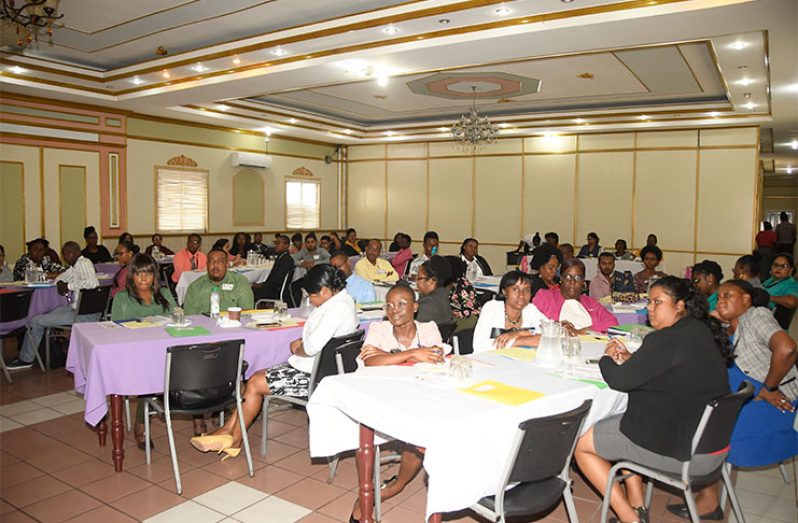THE Public Service Appellate Tribunal is hosting a three-day outreach programme at Regency Suites in Georgetown, to sensitise public officials on the service they have available to them, as it relates to getting justice for issues within the Public Service Commission (PSC), particularly when seeking redress.
At the opening of the programme on Tuesday, Registrar of the Tribunal, Petronilla Browne-Stewart, said that the Tribunal serves as a court for public officers, but it is more cost effective than the courts.
She explained to the attendees the process that has to be undertaken in order for their matters to be heard. “You first have to file Notice of Appeal to the Tribunal, supported by an affidavit, after which we will have a preliminary hearing, then the appeal will be served on the Public Service Commission, and then PSC has to show cause why the appeal should not be allowed, then we will have a hearing, and a decision will be passed.
During this time, the officers can speak on their own behalf. No representation from an attorney is necessary. This is where the cost effectiveness comes in. Additionally, the long time to have your matters heard at the law courts, is not the same with the Tribunal,” Browne-Stewart said.
Noting further, that the decision made by the Tribunal is final, and no other court can intervene on their decision.
Chairman of the Tribunal, Justice (Rt’d) Nandram Kissoon, gave a historical review on the Tribunal. The information given to the officers who attended the outreach, states that “the Public Service Appellate Tribunal was established by Act 17/1984, now cap.27:01, to hear and determine appeals of public officers aggrieved by the decision of the Public Service Commission regarding disciplinary action or appointment by promotion.

The Tribunal consists of three members including a chairman and two members appointed by the President and serve at three year intervals. Although the members of the bench of the Tribunal are appointed by the President, they are not subject to the authority of any person or body. Therefore, the Tribunal is independent.
An appeal may be brought to the Tribunal within ninety days from when the aggrieved person became aware of the decision or was informed, whichever is earlier.
The bench of the Tribunal has the power of a Judge of the High Court to summon and examine witnesses.
Even though the Tribunal was in existence for decades, it was not functioning for over 20 years, since the previous administration had put a halt to its operations. It was in 2017, two years after the coalition government would have taken over, that the Tribunal was reconstituted. When the decision was made to reconstitute the Tribunal, Joseph Harmon, who was the Minister of State at that time, had said the appointment of the Public Service Appellate Tribunal is part of government’s commitment to addressing the conditions of terms and service, including wages for public servants.
“The Tribunal, which had lapsed for more than 20 years, had negatively affected the appointments, promotions and other issues for several public servants who had no other recourse other than taking court action,” Harmon had said.
Due to this, he further noted, many cases were delayed and issues unresolved. The appointment of the Tribunal, is part of a raft of measures, that will improve the quality of service of the nation’s public servants, and the issues which need to be dealt with, will not be addressed in a piecemeal manner. It will also provide a mechanism for redress, against any perceived wrongful action, to enable public servants to discharge their duties fearlessly, and they will be protected against any form of victimisation or illegal sanction for doing so.
Browne-Stewart told the Guyana Chronicle that since the Tribunal was reconstituted, no sensitisation was really done, to have persons become aware of what is available to them.
Due to the aforementioned, this three-day seminar will serve as a start to increasing awareness of the Tribunal; to encourage public officers to utilise the Tribunal; to address questions raised, regarding the tribunal; and to sensitise public officers of an expeditious and more affordable alternative to the courts when seeking redress.



.jpg)










